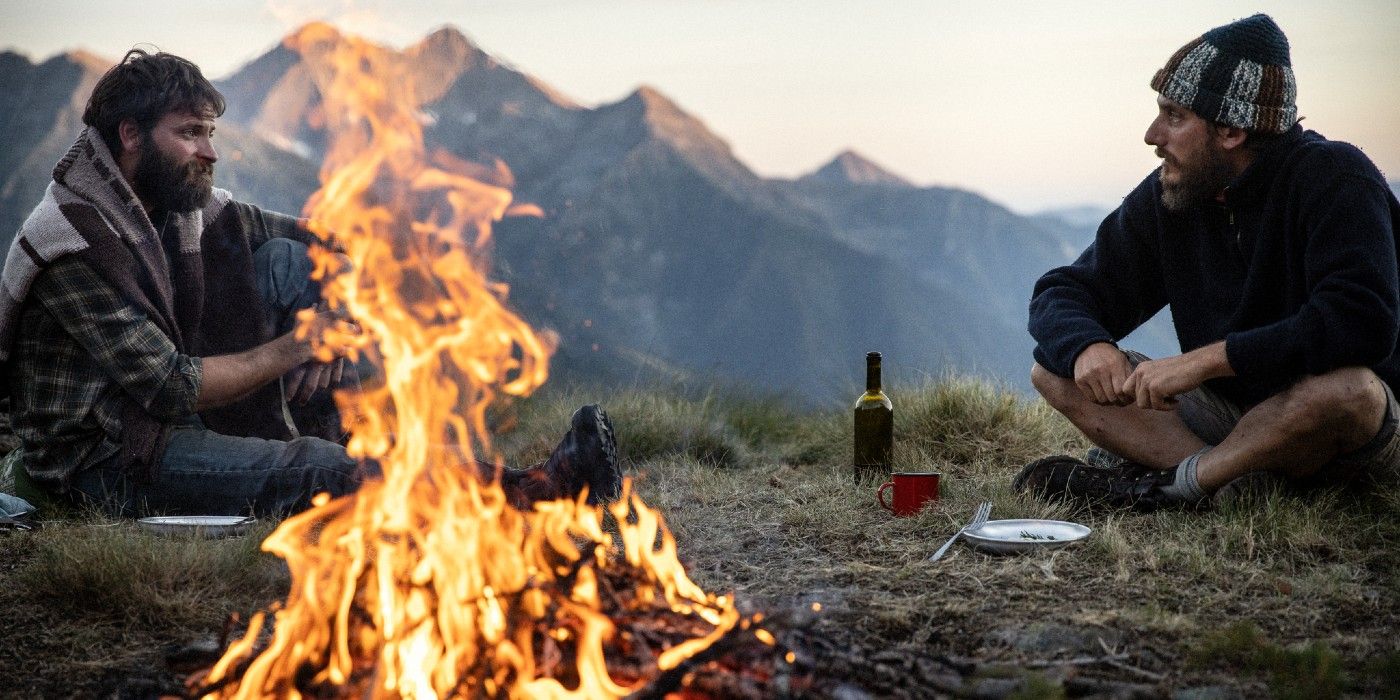In Paolo Cognetti's Le otto montagne, the narrator ruminates, "If the point at which you immerse yourself in the river is the present...then the past is the water that has flowed past you." The Eight Mountains, an adaptation of Cognetti's novel written by the author alongside directors Felix van Groeningen and Charlotte Vandermeersch, follows Pietro (Luca Marinelli) from adolescence to adulthood and the film is like the river Cognetti writes about. Like the book it's based on, The Eight Mountains is a contemplative film, one that uses its lengthy runtime to settle in and take you through the four or so decades in which it tracks Pietro's relationship with Bruno (Alessandro Borghi), a friendship that is achingly pure even as outside forces alter the course of it.
Pietro and Bruno meet one summer in the Italian Alps. The pair come from two vastly different backgrounds: Pietro's family is renting a cabin for the summer before they return to the city, while Bruno lives with his aunt and uncle while his father works construction jobs. Vandermeersch and Groeningen stage these early scenes beautifully — the camera feels closer to its subjects and the mountainside meadows they run through, emphasizing the young actors' size against the towering mountains. Francesco Palombelli and Andrea Palma, who play young Bruno and Pietro, respectively, imbue their performance with a delicate innocence that is crucial to the events that unfold in The Eight Mountains.
As Pietro and Bruno grow older, the camera feels as if it is subtly zooming out, framing Pietro and Bruno against vast, empty landscapes, mimicking the feeling of slow isolation that creeps up on you through the years. Pulled apart by circumstances beyond their control, it's nearly two decades before the pair reunite, and it's fitting that what brings them back together is the very thing that drove them apart. There's no room for melodramatics, here, though — The Eight Mountains is careful in its depiction of friendship, tender in the way it follows Pietro and Bruno as they learn about each other (and themselves) all over again.
That process isn't easy. The Eight Mountains is an exacting film — it does not shy away from the monotony of trekking up a mountain or building a stone house layer by layer. It looks at relationships similarly. Pietro and Bruno's friendship is filled with quiet moments that, if not recognized by the film, would not seem all that meaningful. Some will find this part of the film slow and its runtime certainly contributes to that, but The Eight Mountains wouldn't work its way under the skin the way that it does if it didn't have the time to. It's a film that sneaks up on its audience, revealing layers to friendship and other intimate relationships that otherwise would not be parsed through if there wasn't the time.
Taken literally, the complete quote, when finished, seems to represent both Pietro and Bruno: "...the future is the water that comes down from above, bringing dangers and surprises. The past is in the valley, the future is in the mountains." Pietro lingers in the valley waters, letting the future wash over him. Bruno, on the other hand, swims upstream, against the current and into the future. He also, quite literally, spends most of The Eight Mountains on a mountain, the one that meant the most to Pietro's father Giovanni. It takes a while for Pietro to catch up to him, but that process is what makes The Eight Mountains, and the lives it examines over three decades, so affecting. It's paradoxical, sure —The Eight Mountains lacks forward momentum many are used to in a narrative like this, but if you let it wash over you like the river of the past, it can be a deeply rewarding experience.
The Eight Mountains is now playing in select theaters. The film is 147 minutes long and is currently unrated.

